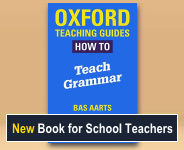Explanation
A closed class of words, including he, I and you, which can generally stand in for a noun phrase.
Pronouns are normally used like nouns, except that:
- they are grammatically more specialised
- it is harder to modify them.
In the examples, each sentence is written twice: once with nouns, and once with pronouns (in red). Where the same thing is being talked about, the words are shown in bold.
- Amanda waved to Michael. She waved to him.
- John’s mother is over there. His mother is over there.
- The visit will be an overnight visit. This will be an overnight visit.
- Simon is the person: Simon broke it. He is the one who broke it.
Note that pronouns often occur not just in similar positions to nouns, but also in similar positions to entire noun phrases, e.g.
- The children went to the park. ~They went to the park.
As well as personal pronouns like they and him, there are many other types of pronoun, including demonstrative pronouns (this, these, that), e.g. that is amazing!, indefinite pronouns (who, which, what, etc.) and reciprocal pronouns (each other, one another). Who and that are relative pronouns when they relate to an antecedent (e.g. That is the fox that we saw last night)
Some pronouns can change their form depending on their function. For example, in Subject position we have I, she, he, we, they, who, whereas in Object position we have me, her, him, us, them, whom. This is a distinction of case.
Englicious contains many resources for English language in schools, but the vast majority of them require you to register and log in first. For more information, see What is Englicious?

